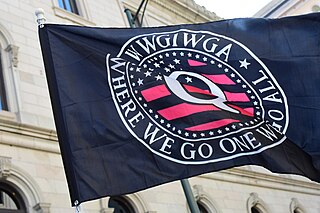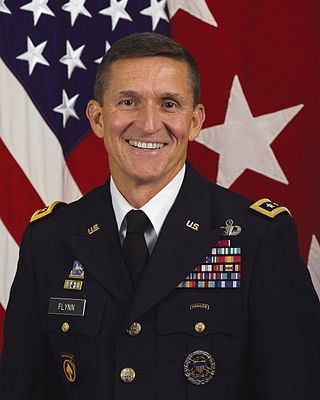Veteran Intelligence Professionals for Sanity (VIPS) is a group of former officers of the United States Intelligence Community formed in January 2003. In February 2003, the group issued a statement accusing the Bush administration of misrepresenting U.S. national intelligence information in order to push the US and its allies toward that year's US-led invasion of Iraq. The group issued a letter stating that intelligence analysts were not being heeded by policy makers. The group initially numbered 25, mostly retired analysts.
Michael F. Scheuer, is an American former intelligence officer for the Central Intelligence Agency, blogger, author, commentator and former adjunct professor at Georgetown University's Center for Peace and Security Studies. One assignment during his 22-year career was serving as Chief of the Bin Laden Issue Station from 1996 to 1999. He also served as Special Advisor to the Chief of Alec Station from September 2001 to November 2004.

QAnon is a far-right American political conspiracy theory and political movement that originated in 2017. QAnon centers on fabricated claims made by an anonymous individual or individuals known as "Q". Those claims have been relayed and developed by online communities and influencers. Their core belief is that a cabal of Satanic, cannibalistic child molesters is operating a global child sex trafficking ring that conspired against President Donald Trump. QAnon has direct roots in Pizzagate, an Internet conspiracy theory that appeared one year earlier, but also incorporates elements of many different conspiracy theories and unifies them into a larger interconnected conspiracy theory. QAnon has been described as a cult.

John Owen Brennan is a former American intelligence officer who served as the Director of the Central Intelligence Agency (CIA) from March 2013 to January 2017. He served as chief counterterrorism advisor to U.S. President Barack Obama, with the title Deputy National Security Advisor for Homeland Security and Counterterrorism, and Assistant to the President. Previously, he advised Obama on foreign policy and intelligence issues during the 2008 election campaign and presidential transition.
A deep state is a type of government made up of potentially secret and unauthorized networks of power operating independently of a state's political leadership in pursuit of their own agenda and goals. In popular usage, the term carries overwhelmingly negative connotations and is often associated with conspiracy theories.

Michael Thomas Flynn is a retired United States Army lieutenant general who was the 24th U.S. national security advisor for the first 22 days of the first Trump administration. He resigned in light of reports that he had lied regarding conversations with Russian ambassador to the United States Sergey Kislyak. Flynn's military career included a key role in shaping U.S. counterterrorism strategy and dismantling insurgent networks in the Afghanistan and Iraq Wars, and he was given numerous combat arms, conventional, and special operations senior intelligence assignments. He became the 18th director of the Defense Intelligence Agency in July 2012 until his forced retirement from the military in August 2014. During his tenure he gave a lecture on leadership at the Moscow headquarters of the Russian military intelligence directorate GRU, the first American official to be admitted entry to the headquarters.
Spygate is a disproven conspiracy theory peddled by 45th U.S. president Donald Trump and his political base on many occasions throughout his presidential term. It primarily centered around the idea that a spy was planted by the Obama administration to conduct espionage on Trump's 2016 presidential campaign for political purposes. On May 17, 2018, Trump tweeted: "Wow, word seems to be coming out that the Obama FBI 'SPIED ON THE TRUMP CAMPAIGN WITH AN EMBEDDED INFORMANT.'" In that tweet, he quoted Andrew C. McCarthy, who had just appeared on Fox & Friends repeating assertions from his own May 12 article for National Review.

William "Bill" Edward Binney is a former intelligence official with the United States National Security Agency (NSA) and whistleblower. He retired on October 31, 2001, after more than 30 years with the agency.

The Russian government conducted foreign electoral interference in the 2016 United States elections with the goals of sabotaging the presidential campaign of Hillary Clinton, boosting the presidential campaign of Donald Trump, and increasing political and social discord in the United States. According to the U.S. intelligence community, the operation—code named Project Lakhta—was ordered directly by Russian president Vladimir Putin. The "hacking and disinformation campaign" to damage Clinton and help Trump became the "core of the scandal known as Russiagate". The 448-page Mueller Report, made public in April 2019, examined over 200 contacts between the Trump campaign and Russian officials but concluded that there was insufficient evidence to bring any conspiracy or coordination charges against Trump or his associates.

On March 4, 2017, Donald Trump wrote a series of posts on his Twitter account that falsely accused former President Barack Obama's administration of wiretapping his "wires" at Trump Tower late in the 2016 presidential campaign. Trump called for a congressional investigation into the matter, and the Trump administration cited news reports to defend these accusations. His initial claims appeared to have been based on a Breitbart News article he had been given which repeated speculations made by conspiracy theorist Louise Mensch or on a Bret Baier interview, both of which occurred the day prior to his Tweets. By June 2020, no evidence had surfaced to support Trump's claim, which had been refuted by the Justice Department (DOJ).

Ezra Cohen, also known as Ezra Cohen-Watnick, is an American intelligence official who served as the acting under secretary of defense for intelligence during the first Trump Administration. He previously served as the acting assistant secretary of defense for special operations and low-intensity conflict, national security adviser to the United States attorney general and as a former senior director for intelligence programs for the United States National Security Council (NSC).
Crossfire Hurricane was the code name for the counterintelligence investigation undertaken by the Federal Bureau of Investigation (FBI) from July 31, 2016, to May 17, 2017, into links between Donald Trump's presidential campaign and Russia and "whether individuals associated with [Trump's] presidential campaign were coordinating, wittingly or unwittingly, with the Russian government's efforts to interfere in the 2016 U.S. presidential election". Trump was not personally under investigation until May 2017, when his firing of FBI director James Comey raised suspicions of obstruction of justice, which triggered the Mueller investigation.

Since 2016, then-presidential candidate Donald Trump and his allies have promoted several conspiracy theories related to the Trump–Ukraine scandal. One such theory seeks to blame Ukraine, instead of Russia, for interference in the 2016 United States presidential election. Also among the conspiracy theories are accusations against Joe Biden and his son Hunter Biden, and several elements of the right-wing Russia investigation origins counter-narrative. American intelligence believes that Russia engaged in a years long campaign to frame Ukraine for the 2016 election interference, that the Kremlin is the prime mover behind promotion of the fictitious alternative narratives, and that these are harmful to the United States. FBI director Christopher A. Wray stated to ABC News that "We have no information that indicates that Ukraine interfered with the 2016 presidential election" and that "as far as the [2020] election itself goes, we think Russia represents the most significant threat."
The Russia investigation origins counter-narrative, or Russia counter-narrative, is a narrative embraced by Donald Trump, Republican Party leaders, and right-wing conservatives attacking the legitimacy and conclusions of investigations into Russian interference in the 2016 elections, and the links between Russian intelligence and Trump associates. The counter-narrative includes conspiracy theories such as Spygate, accusations of a secretive, elite "deep state" network, and other false and debunked claims. Trump in particular has attacked not only the origins but the conclusions of the investigation, and ordered a review of the Mueller report, which was conducted by attorney general William Barr – alleging there was a "deep state plot" to undermine him. He has claimed the investigations were an "illegal hoax", and that the "real collusion" was between Hillary Clinton, Democrats, and Russia – and later, Ukraine.

Kashyap Pramod Vinod Patel is an American lawyer and former federal prosecutor at the U.S. Department of Justice. Previously, he served as Chief of Staff to the acting U.S. secretary of defense Christopher C. Miller, and senior advisor to the acting director of national intelligence Richard Grenell, both during the first presidency of Donald Trump. In November 2024, President-elect Trump nominated Patel to succeed Christopher A. Wray as director of the Federal Bureau of Investigation.

As part of a large and baseless conspiracy theory, Donald Trump posited that Barack Obama had spied on him, which Trump described as "the biggest political crime in American history, by far." The series of accusations have been nicknamed Obamagate. Obama had served as President of the United States from 2009 until 2017, when Trump succeeded him; Trump served as president until 2021.
In United States politics, conspiracy theories are beliefs that a major political situation is the result of secretive collusion by powerful people striving to harm a rival group or undermine society in general.

Since the movement's emergence in 2017, adherents of the QAnon far-right conspiracy theory have been involved in a number of controversial events, some of them violent, resulting in the filing of criminal charges and one conviction for terrorism.











